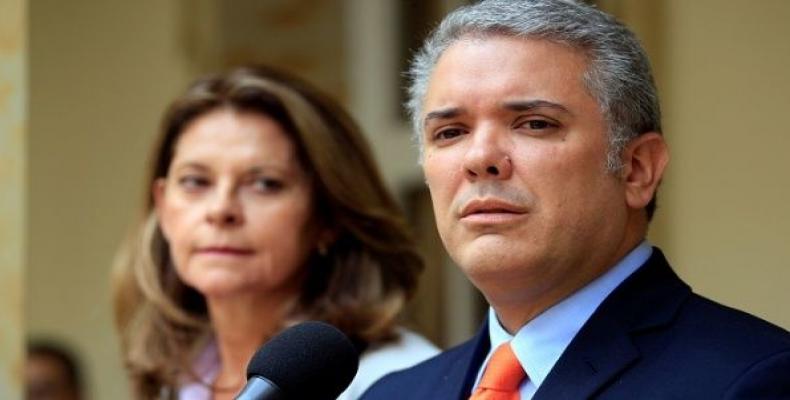Bogota, July 11 (RHC)-- Joining the recent efforts by right-wing governments in the region to destroy integration and regional sovereignty, Colombia's president-elect Ivan Duque reaffirmed his intentions to withdraw from the Union of South American Nations (UNASUR).
“I will promote the withdrawal of Colombia from UNASUR, a resonance box of the dictatorship. We will support the appeal of Luis Almagro to investigate the dictator and his accomplices for their crimes at the International Criminal Court," Duque said in an interview with EFE in Madrid in an attack on UNASUR and the government of Venezuela. He said that about one million Venezuelans have moved to Colombia “escaping” adversities in their country of origin, besides others going to other neighboring countries.
Duque has several times expressed his willingness to disband UNASUR, the only regional integration body with no United States presence, promoting instead the interventionist Organization of American States (OAS) as a viable alternative to the body.
The Colombian president-elect has vowed to reverse the historic peace deal that was brokered between the government of Manuel Santos and the former guerrilla group Revolutionary Armed Forces of Colombia, FARC, which is threatening the country with more violence and U.S. presence that leads to bolstering paramilitary groups that oppose the deal. Duque, and his mentor former president Alvaro Uribe, have themselves been exposed as connected to the country ruthless right-wing paramilitaries who have have a history of killing social leader and leftists.
In April, Argentina, Brazil, Chile, Colombia, Paraguay and Peru, all led by right-wing governments, announced they were “temporarily” withdrawing from the regional integration body after Bolivia assumed the provisional leadership. The countries cited concerns over the inability to appoint a new Secretary General since former Colombian President Ernesto Samper's term came to an end as Secretary General in January 2017.
In Ecuador, the President Lenin Moreno offered UNASUR's headquarters as the new building for an Indigenous university, a move welcomed by the Confederation of Indigenous Nationalities of Ecuador (Conaie), whose leadership has sided with the right-wing sectors in the country in recent years.
"The UNASUR building was ceded to the countries that make it up. We are going to ask UNASUR to return that building so it can be better used. We are not opposed to integration, but it hasn't worked because of a disrespect of others," Moreno posted on his Twitter account.
However, this was interpreted by others as a hostile decision towards. “Will the indigenous movement be an accomplice of the destruction of UNASUR? I can't believe it!,” tweeted the former Ecuadoraan President Rafael Correa.
The bloc is entering a financial crisis as only three of its member states, Bolivia, Guyana and Surinam, have been paying their corresponding fees.
Yuri Chillan, the provisional head of UNASUR, recently issued a statement declaring that if member states don't pay the fees in July, the organization won't be able to pay salaries. “Considering that if by July 30 of the present year there are not enough resources to pay the needs of the last trimester of the year, the institution will have to stop paying,” says Chillan in a statement.
Colombian president-elect reaffirms intention to withdraw from UNASUR

Related Articles
Commentaries
MAKE A COMMENT
All fields requiredMore Views
- Cuban Martinez Saves 23rd Game in Japanese Baseball
- Cuban deputy foreign minister reiterates rejection of unilateral extraterritorial measures
- Oil and gas will continue to be the driver of the global economy throughout the 21st century / Interview with the global energy economist, Dr. Mamdouh Salameh
- Mixed Doubles Will Be the Main Attraction in the Caribbean Table Tennis Tournament
- Cuba calls for the urgent mobilization of the international community to stop the Zionist military escalation and a direct attack by the United States against Iran

